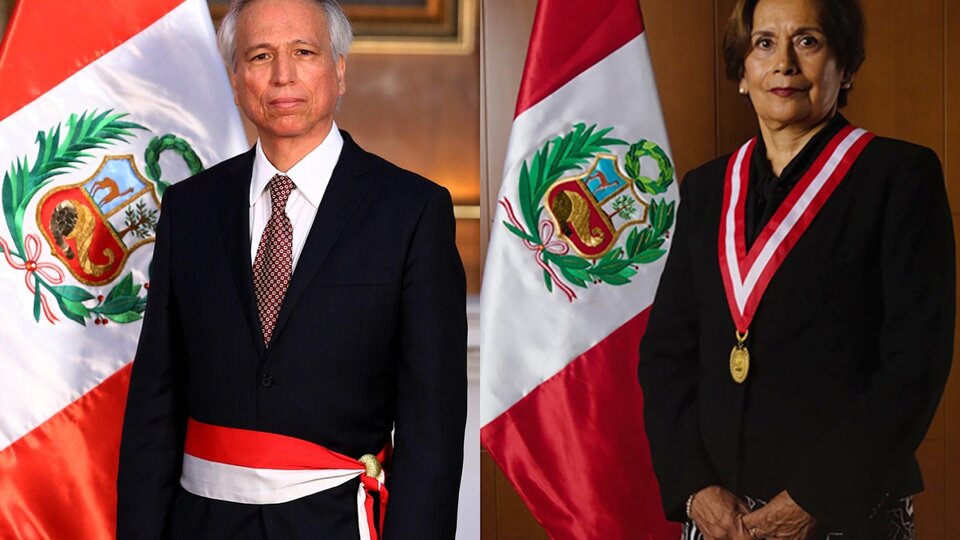
Page/12 in Peru
From Lima
A parliamentary coup against Peru's judicial and electoral systems. In a vote marred by irregularities, the right-wing majority Congress removed from office and disqualified for ten years two magistrates from the National Board of Justice (JNJ), the body that appoints and dismisses judges and prosecutors, including the Supreme Court. and heads of electoral bodies.
The goal is to acquire this key creature. Fujimorism and its allies have pushed for the disqualification of six of the JNJ's seven members — the seventh has recently joined the organization and is close to the sector — but some legislators from the right-wing camp don't want to go that far. A vote to disqualify JNJ president Antonio de la Jaza was postponed until Monday. The impeached judges, Inés Tello and Aldo Vásquez, were important voices in defense of the autonomy of the JNJ and were the main targets of those promoting the coup against the organization. Delo has said he will not abide by his disqualification because he considers the vote that approved it to be illegal.
They seek a new majority
This partial victory by Fujimori and his allies opens the door to forming a majority in the JNJ, with the dismissal of two important judges. It would ensure they have a decisive influence on the justice system when it comes to the trials of political leaders such as Keiko Fujimori and take control of electoral systems – which must be approved or replaced by the JNJ this year – before the election. 2026. Disqualified Tello and Vásquez led corruption investigations at JNJ against suspended Attorney General Patricia Benavides, a right-wing ally. Removing them would frustrate these processes and seek to reinstate Benavides.
Perú Libre (PL), the Marxist-Leninist party that brought Pedro Castillo into government and later broke with the former president, joined Fujimori and its allies in the attack on the JNJ. PL's general secretary, Vladimir Cheron, is a fugitive from corruption charges and other judicial processes are ongoing.
“Democracy is at stake. The military dictatorship (1968-1975) or the 1992 coup (by Alberto Fujimori), nothing like this has been seen in the country,” said Aldo Vasquez, who was the vice president of the JNJ.
Tello and Vásquez were disqualified by a constitutional impeachment with 67 votes, at least to ratify it, which was reached by a vote of one congressman who was prevented from voting. Constitution and Congressional rules barred the 30 members of the Permanent Commission from participating in this second instance, which approves a constitutional impeachment in the first instance and presents it to a full session of Congress for its final vote. José Luna, a member of parliament from the right-wing party Podemos Peru, voted in plenary despite being a member of the Permanent Commission. Luna faces several judicial actions for corruption.
A judge asks for an annulment
Judge Delo has requested that Congress invalidate Luna's vote as illegal and therefore void her disqualification. He stated that he continues to consider himself a member of the JNJ. The parliamentary majority responded that Luna was empowered to vote because he had not done so in the Standing Committee. But the Constitution expressly establishes that members of the Permanent Commission are “debarred” from participating in a plenary vote of Congress on constitutional impeachment, regardless of whether or not they voted in the first instance.
“Constitution asserted. To explain that anyone who does not vote in the Permanent Commission has the power to vote in plenary is to make a distinction where the Constitution does not do so,” noted constitutionalist Luciano López. Other eminent jurists have expressed their opinion to the same effect.
An “age thing”
The constitutional charge armed in Congress against the members of the JNJ was an argument that they kept Inés Tello in her position when the constitution establishes that this is the age limit for membership in the organization after reaching the age of 75. The judges of the JNJ responded that this age limit required applying and entering the system, but another article of the constitution stipulated that the post be sworn for five years and attaining the age of 75 during that period was not established. Reason for dismissal. They recalled that the commission that appointed the current JNJ had the same interpretation and that is why it appointed Tello for a five-year period from 2020-2025 when Tello was already 74 years old.
Samuel Abad, one of the JNJ lawyers who appeared before the Congress, mentioned this “Congress may not disqualify members of a body for not sharing its interpretive criteria, such as to affect the autonomy and independence of the judicial system.”.
Beyond the controversy over Judge Tello's age and the constitutional ambiguity leading to various interpretations, the truth is that the matter is a pretext made by the right-wing and far-right Congress to overthrow Fujimoriism. They are members of an organization they wish to control.
Fujimorism and its allies have advanced to take over the justice and electoral systems. Threats to anti-corruption processes are increasing. And battered democracies are further weakened.

“Introvert. Thinker. Problem solver. Evil beer specialist. Prone to fits of apathy. Social media expert. Award-winning food fanatic.”





More Stories
Ranking of the most powerful passports: what position Argentina occupies in the world and continent
Two US Air Force B-52H bombers arrive in Romania after being intercepted by Russian fighters.
Maduro sends troops to intimidate the enemy, but the soldiers want to see Maria Corina Machado: “Has the lady arrived?”